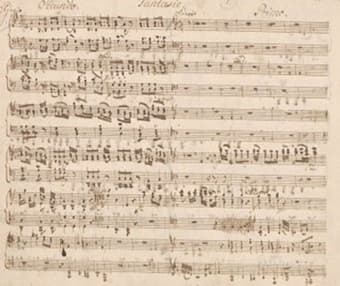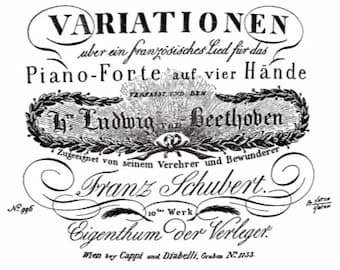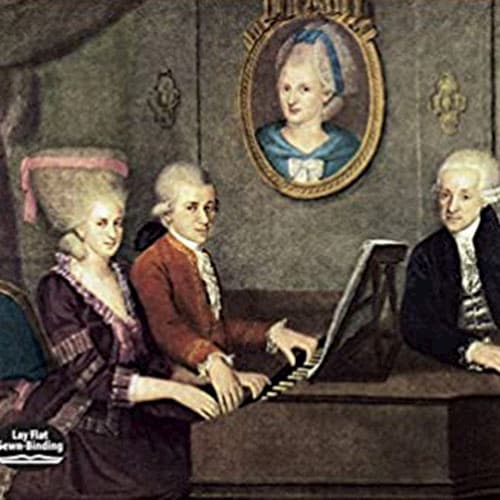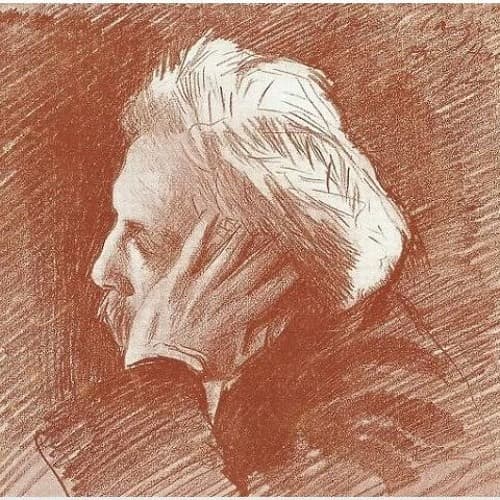“It is no coincidence that the literature of ‘original compositions’ for four hands is limited to this period….its true master is Schubert.”
Quoted from Theodor Adorno’s article, “Four Hands, Once Again.”

© Stanford University
Music for piano four hands came to popularity almost at the same time as music for solo piano. Piano had become an instrument for domestic use by the middle class in Europe in the second half of the 18th century. Composers of the First Viennese School, such as Haydn, Mozart, Beethoven, and Schubert, contributed compositions for piano four hands. The pieces were used both for instruction and for performance. A type of piano duet, music for piano four hands involves two pianists playing “primo” and “secondo” at the same piano together. These pieces are suitable for instruction as students can learn through their partners and learn how to cooperate through the intimate writing for piano four-hand. There are many works for piano four hands suitable for professional concert performances, but perhaps the intimacy and technical challenges of this genre limit its popularity.

Franz Schubert
Franz Schubert (1797-1828) wrote over forty works for piano four hands throughout his short life, including his earliest known work. Even though Schubert was not the first composer to write music for piano four-hand, his extensive collection of music for piano four hands spans a wide range of styles from fantasies and sonatas to concert marches and rondos. Fantasy in F minor, D. 940, is perhaps one of the most famous pieces for four hands of all time, so much so that it overshadows other significant four-hand compositions. It will be discussed in this article.
Franz Schubert: Fantasie in F Minor, Op. 103, D. 940 (Sviatoslav Richter, piano; Benjamin Britten, piano)
His earliest known work: Fantasie in G major, D.1

Manuscript of Fantasy in G major, D.1
Schubert’s catalog of works for piano four hands begins and ends with fantasies. While the first fantasy, Fantasie in G major, D.1 (1810, was his earliest known work among all genres of his entire catalog. He composed this work when he was only 13 years old probably as a composition assignment. Although this work is not as famous as Fantasy in F minor, D. 940, this piece shows the influences of Beethoven and previews Schubert’s later unique styles of writing:
Franz Schubert: Fantasie in G Major, D. 1 (Tal and Groethuysen Duo)
Influence from Hungarian idioms
The majority of Schubert’s works were written in connection with his stay at the Count Esterházy’s house at Zseliz, Hungary, in 1818 and 1824, where he gave piano and singing lessons to two young Countesses, Caroline, and Marie. During his stay in Hungary, he became interested in Hungarian folk idioms and styles. Schubert wrote over ten sets of marches for four hands demonstrating style hongrois and employing many Hungarian folk idioms, especially the 3 Marches Heroiques, D. 602, and 3 Military Marches, D. 733, both composed in 1818.
Franz Schubert: 3 Marches heroiques, Op. 27, D. 602 (Jenő Jandó, piano; Zsuzsa Kollár, piano)
Relationship with Beethoven

Cover for Schubert’s Eight Variations on a French Song, Op.10 D.624,
dedicated to Beethoven
Schubert wrote four variations for piano four hands, and he dedicated his 8 Variations on a French Song, Op.10 D. 624, to Beethoven in 1822. Schubert delivered the piece when Beethoven was not at home. However, Beethoven approved it, and there was evidence to show that he played the piece with his nephew every day. Schubert admired Beethoven and his music, and he was the torchbearer at Beethoven’s funeral. Beethoven was such an influence not only reflecting in Schubert’s music but also in his life that Schubert died less than 20 months after Beethoven’s passing.
Schubert: Eight Variations on a French Song, Op.10 D.624
Grand Duo, D. 812
Sonata in C major, “Grand Duo,” D. 812 (1824), was Schubert’s most expansive piano music for four hands. Prior to this, Schubert only wrote two other sonatas and one sonatina for piano four hands, but none of them are as extensive as this work. Schubert wrote these while staying in Court Esterházy’s house. The Grand Duo, D. 812, remains one of the most famous pieces for piano four-hands. Schumann described the piece as a “symphony arranged for the piano.”
Franz Schubert: Sonata for Piano 4 Hands in C Major, Op. 140, D. 812, “Grand Duo” (Radu Lupu, piano; Daniel Barenboim, piano)
Divertissement on a French motif D. 823
Divertissement is a style of music written to amuse audiences and musicians. Schubert wrote two sets of divertissements for four hands. The last set, Divertissement on a French motif D. 823, consists of three movements, and they were composed in 1826 and 1827. While the three movements were first published separately, Schubert completed the first movement in the summer of 1825. It is a brilliant march set in a sonata form. The sorrowful second movement is in theme and variation form and is perhaps one of Schubert’s music’s most beautiful movements for four hands. The last movement is a rondo with a finale. It has a military feel and is as brilliant as the first movement.
Franz Schubert: Divertissement sur des motifs originaux francais, Op. 84, No. 2, D. 823 (Christoph Eschenbach, piano; Justus Frantz, piano)
Final year: Lebenssturme
Schubert wrote two pieces, Fugue in E minor, D952, and Lebenssturme, during the last year of his life. Lebenssturme means “storm of life.” Although Schubert did not title this piece (his publisher Antonio Diabelli did), this descriptive title applies to Schubert’s short but dramatic life.
Schubert: Lebenssturme
Schubert’s music for piano four hands displays the unique beauty of his writing style applied to musical trends of the time. Even though this genre is seldom performed professionally, Schubert’s works for piano four-hands are an artistic achievement and deserve a place in the repertoire of every pianist.
For more of the best in classical music, sign up to our E-Newsletter



I adore Schubert’s piano works for four hands and was delighted to find this article which has given me much pleasure and information. Thank you very much.
Thank you!
I was as well delighted to find this article which I read with great interest. I love all of Schubert’s music but got really interested in the Piano works for four hands. Well done.
Thank you so much for reading this article!
What an amazing performance.
Great article! Thank you!
Actually I am looking for Schubert 4 hands piano pieces that are about 10 minutes or less to play. (We have a time
limit for performance). Any suggestions would be welcome! Thank you!